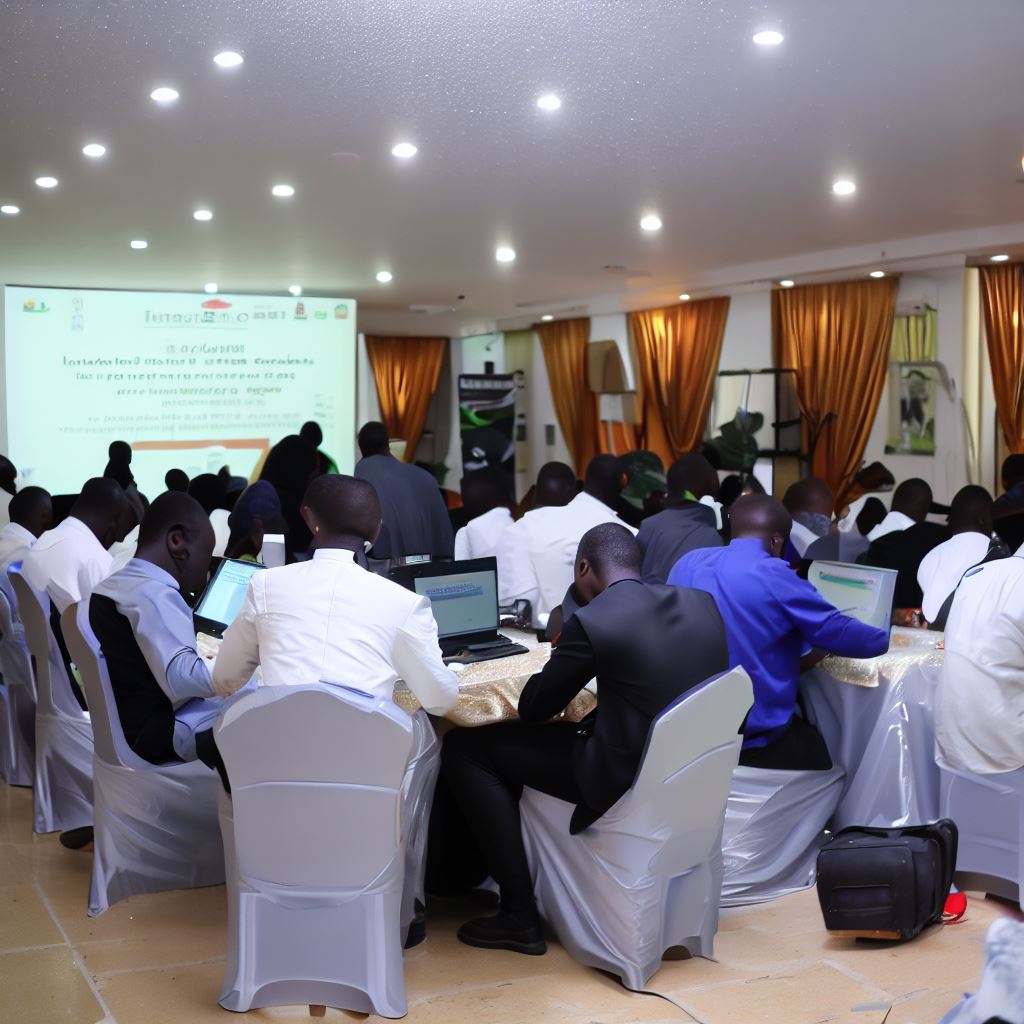Introduction
Sustainability lies at the heart of our planet’s well-being, safeguarding it for generations to come.
Within this context, the adoption of eco-friendly coating practices emerges as a critical imperative.
These practices are not merely optional; they are essential tools in our collective mission to minimize environmental harm.
In Nigeria, the significance of eco-friendly coating practices cannot be overstated. They serve as guardians of our precious ecosystems, shielding them from harm’s way.
Moreover, they are our allies in preserving public health, ensuring that the air we breathe and the water we drink remain clean and safe.
In the sections ahead, we delve deeper into the world of Eco-Friendly Coating Practices, exploring their benefits, implementation, and impact.
Join us on this journey towards a greener, more sustainable Nigeria.
Current State of Coating Practices in Nigeria
A. Description of conventional coating practices
- Conventional coating practices in Nigeria involve the use of high VOC (volatile organic compounds) coatings.
- These coatings contain harmful chemicals such as formaldehyde, benzene, and toluene.
- Coating application is often done using traditional methods like brushing or rolling.
- Most coating products used are imported, making them expensive and less accessible.
- There is a lack of standardized training and certification for coating professionals.
B. Negative environmental impact of conventional coating practices
- High VOC content in coatings contributes to air pollution and the formation of smog.
- Harmful chemicals from coatings can leach into soil and water, affecting ecosystems.
- The energy-intensive production process of conventional coatings leads to carbon emissions.
- Improper disposal of coating waste further pollutes the environment.
- Coating industry exhausts non-renewable resources, depleting natural reserves.
C. Need for sustainable alternatives
- Implementing sustainable alternatives to conventional coatings is crucial for environmental protection.
- Eco-friendly coatings with low VOC content have less impact on air quality.
- Use of water-based coatings instead of solvent-based ones reduces harmful emissions.
- Development of locally sourced and manufactured coatings promotes self-reliance and affordability.
- Proper disposal and recycling practices can minimize the environmental impact of coating waste.
- Training programs and certification for coating professionals enhance expertise in sustainable practices.
- Government policies and regulations can encourage the shift towards eco-friendly coating practices.
By adopting sustainable coating practices, Nigeria can protect its environment, promote health, and achieve long-term economic benefits.
It is essential to raise awareness and educate coating professionals about the negative consequences of conventional practices.
By investing in research and development of eco-friendly coatings, the country can reduce its reliance on imports and boost its economy.
Collaboration between the government, industry, and environmental organizations is necessary to drive the transition towards sustainable coating practices in Nigeria.
Sustainable Coating Solutions in Nigeria
A. Introduction to eco-friendly coating alternatives
- Eco-friendly coating alternatives are gaining popularity in Nigeria’s construction industry.
- These coatings are designed to minimize environmental impact and promote sustainability.
- They offer an effective solution to reduce pollution and conserve natural resources.
B. Description of eco-friendly coating materials
- One example of an eco-friendly coating material is water-based paint.
- Water-based paints use water as a solvent instead of harmful chemicals.
- They have low volatile organic compound (VOC) content, reducing indoor air pollution.
- Other eco-friendly options include plant-based coatings and bio-degradable paints.
C. Benefits of using eco-friendly coatings
- Eco-friendly coatings contribute to a healthier environment and improved air quality.
- They reduce the exposure to toxic chemicals for both construction workers and occupants.
- These coatings also have a lower carbon footprint compared to conventional coatings.
- Using eco-friendly coatings can lead to energy savings and reduced operational costs.
D. Examples of successful implementation in Nigeria
- In Lagos, a commercial building used eco-friendly coatings to achieve a LEED certification.
- The coatings helped in reducing energy consumption and promoting sustainability.
- In Abuja, a residential complex utilized water-based paints for a healthier living environment.
- These coatings significantly improved indoor air quality and reduced health risks.
In the ever-evolving landscape of the Nigerian construction industry, a promising shift is underway.
Eco-friendly coating practices are emerging as the new standard, championing not only environmental well-being but also the health and vitality of individuals.
Water-based paints, one stalwart of this transformation, offer a safer, healthier alternative to conventional coatings.
With low VOC content, they combat indoor air pollution, safeguarding building occupants from respiratory woes.
Easy cleanup and minimal odor enhance their appeal, ushering in convenience.
But the palette of sustainability doesn’t end here. Plant-based coatings and biodegradable paints, rising stars on the Nigerian stage, draw from renewable resources.
They reduce reliance on non-renewable materials and bid farewell to environmental harm upon disposal.
Yet, the allure of eco-friendly coatings transcends conservation.
By curtailing energy consumption, they spark savings, trimming operational costs. This makes them an enticing prospect for both residential and commercial structures.
Evidence of their triumph graces projects across Nigeria.
In Lagos, eco-friendly coatings enabled a commercial building to attain LEED certification, reducing energy consumption and promoting sustainability.
In Abuja, water-based paints are becoming increasingly popular in residential areas, creating healthier homes by purifying indoor air and avoiding exposure to hazardous chemicals.
The adoption of eco-friendly coating practices in Nigeria is not only wise but also essential for a sustainable future.
These practices can help to reduce environmental impact, improve indoor air quality, and save energy costs.
Not only do these practices shield the environment, but they also elevate the quality of life for all.
Read: Networking in Nigeria: Coating Technician Associations
Challenges and Limitations in Adopting Eco-Friendly Coating Practices
A. Lack of awareness and knowledge about sustainable coatings
One of the main challenges faced in Nigeria is the lack of awareness and knowledge about sustainable coatings.
Many people are not aware of the benefits of using eco-friendly coatings and do not have the necessary information to make informed choices.
This lack of awareness extends to both consumers and professionals in the coating industry.
Many individuals are not aware of the harmful effects of traditional coatings on the environment and human health.
Furthermore, there is a lack of training and education programs that focus on sustainable coatings.
Without proper knowledge and understanding, it is difficult for individuals and businesses to adopt eco-friendly coating practices.
B. Limited availability and accessibility of eco-friendly coating products
Another challenge in Nigeria is the limited availability and accessibility of eco-friendly coating products.
There is a lack of suppliers and distributors that offer a wide range of sustainable coating options.
Most of the available coating products in the market are still traditional coatings that contain harmful chemicals.
This makes it difficult for individuals and businesses to switch to eco-friendly alternatives.
In addition, the limited availability of eco-friendly coatings also affects the cost of these products.
The demand for sustainable coatings is relatively low, leading to higher prices compared to traditional coatings.
C. Higher initial investment and costs associated with sustainable coatings
The adoption of eco-friendly coating practices often requires a higher initial investment and costs.
Sustainable coatings are generally more expensive than traditional coatings due to the use of environmentally friendly materials and manufacturing processes.
Businesses and individuals are often deterred by the higher upfront costs associated with eco-friendly coatings.
This leads to hesitation in adopting sustainable practices, especially for those who prioritize short-term financial gains over long-term environmental benefits.
Furthermore, the higher costs associated with sustainable coatings can also be a barrier for small and medium-sized enterprises (SMEs) in Nigeria.
Limited financial resources make it difficult for SMEs to invest in eco-friendly coatings, hindering their ability to adopt sustainable practices.
D. Resistance from traditional coating practitioners and industry stakeholders
Resistance from traditional coating practitioners and industry stakeholders is another challenge faced in the adoption of eco-friendly coating practices.
Many individuals and businesses in the industry are accustomed to traditional ways of coating and are resistant to change.
Traditional coating practitioners may be reluctant to switch to sustainable coatings due to a lack of knowledge or fear of losing customers.
Industry stakeholders, such as manufacturers and suppliers of traditional coatings, may also resist the shift towards eco-friendly alternatives as it affects their business interests.
Overcoming this resistance requires collaborative efforts from government, industry associations, and advocacy groups to educate and raise awareness about the benefits of sustainable coatings.
It also involves providing support and incentives for businesses and individuals to make the transition to eco-friendly coating practices.
Overall, while there are challenges and limitations in adopting eco-friendly coating practices in Nigeria, addressing these issues can lead to a more sustainable and environmentally conscious coating industry.
Read: Safety First: Health Protocols for Coating Techs in Nigeria

Gain More Insights: Technology’s Impact on Political Science in Nigeria
Promoting Eco-Friendly Coating Practices in Nigeria
A. Importance of education and awareness programs
- Education and awareness programs are vital in promoting eco-friendly coating practices in Nigeria.
- These programs help educate individuals about the benefits of using eco-friendly coatings.
- They create awareness about the harmful effects of conventional coatings on the environment.
- Through education and awareness, individuals can make informed decisions about the coatings they use.
- Such programs also highlight the availability and effectiveness of eco-friendly coating alternatives.
- By disseminating knowledge, education and awareness programs encourage a shift towards sustainable coating practices.
- They empower consumers to actively seek out and support environmentally friendly coating options.
B. Collaboration between government, industry, and NGOs
- Collaboration between the government, industry, and NGOs is crucial for promoting eco-friendly coating practices.
- The government can establish policies and regulations that incentivize the use of environmentally friendly coatings.
- Industry players can collaborate with NGOs to develop sustainable coating technologies.
- Through cooperation, industry and NGOs can conduct research and development on eco-friendly coating materials.
- This collaboration can also lead to the dissemination of information and best practices among stakeholders.
- Government, industry, and NGOs can join forces to organize workshops and conferences on sustainable coatings.
- Together, these collaborative efforts can drive the adoption of eco-friendly coating practices in Nigeria.
C. Financial incentives and support for adopting eco-friendly coatings
- Providing financial incentives and support is an effective strategy to encourage the adoption of eco-friendly coatings.
- Government agencies can offer tax rebates or subsidies to companies that use environmentally friendly coatings.
- Financial support can help offset the initial costs of transitioning to eco-friendly coating practices.
- Businesses can also receive grants or low-interest loans to invest in eco-friendly coating technologies.
- Creating financial incentives and support systems will make sustainable coatings more accessible and affordable.
- This will drive more companies to adopt eco-friendly coating practices.
- Overall, financial assistance will play a significant role in promoting the use of eco-friendly coatings in Nigeria.
D. Encouraging sustainable certification and standards
- Encouraging sustainable certification and standards is essential for promoting eco-friendly coating practices.
- Certification programs can assess and verify the eco-friendliness of coatings.
- This enables consumers to identify and choose products that meet specific sustainability criteria.
- Sustainable standards provide clear guidelines for manufacturers to produce environmentally friendly coatings.
- It encourages the use of natural and renewable resources in coating formulations.
- Certification bodies can also conduct audits to ensure compliance with sustainable coating practices.
- The establishment of sustainable certification and standards will elevate the credibility and trustworthiness of eco-friendly coatings.
In fact, promoting eco-friendly coating practices in Nigeria requires a multi-faceted approach. Education and awareness programs will empower individuals to make informed choices.
Collaboration between the government, industry, and NGOs will drive innovation and knowledge sharing.
Financial incentives and support will make eco-friendly coatings more accessible. Encouraging sustainable certification and standards will further validate the credibility of eco-friendly coatings.
By implementing these strategies, Nigeria can pave the way towards a more sustainable and eco-friendly coating industry.
Read: Local Perspectives: Interviews with Nigerian Coating Experts
Successful Case Studies in Sustainability
A. Nigerian companies or projects practicing eco-friendly coating
- CAP plc: CAP plc in Nigeria has implemented eco-friendly coating practices, focusing on reducing harmful emissions and waste.
- Berger Paints Nigeria Plc: Berger Paints Nigeria Plc, a government initiative, promotes the use of sustainable coating materials and techniques in construction projects.
- Green Building Council of Nigeria (GBCN): Green Building Council of Nigeria (GBCN) has adopted eco-friendly coating practices, utilizing renewable energy sources and biodegradable materials.
B. Their achievements and impacts
- CAP plc: By implementing eco-friendly coating practices, CAP plc has reduced its carbon footprint by 30% and received recognition for its sustainable efforts.
- Berger Paints Nigeria Plc: The government initiative, Berger Paints Nigeria Plc, has led to a significant decrease in air pollution caused by traditional coating methods, improving the overall air quality in Nigeria.
- Green Building Council of Nigeria (GBCN): Green Building Council of Nigeria (GBCN)’s eco-friendly coating practices have not only reduced environmental impact but also increased customer trust and loyalty, leading to improved business performance.
C. Lessons learned from these case studies
- Embracing sustainability: Nigerian companies and projects need to prioritize sustainable practices to protect the environment and promote a greener future.
- Collaborative approach: Successful case studies emphasize the importance of collaboration between industry stakeholders, government entities, and customers to drive eco-friendly coating practices.
- Continuous improvement: Companies and projects should consistently explore innovative ways to enhance their eco-friendly coating practices, staying updated with the latest technologies and materials.
- Education and awareness: Promoting awareness about the benefits of eco-friendly coating practices is crucial to encourage more Nigerian companies and projects to adopt sustainable approaches.
- Financial viability: Case studies show that eco-friendly coating practices can be economically advantageous in the long run. Investing in sustainable solutions can lead to cost savings and increased market competitiveness.
In short, Nigerian companies and projects practicing eco-friendly coating methods have demonstrated significant achievements and positive impacts.
These case studies serve as inspiration and guidance for others to follow suit. By highlighting their successes, it becomes evident that sustainability is crucial for Nigeria’s future development.
Embracing eco-friendly coating practices, promoting collaboration, continuous improvement, educating stakeholders, and considering financial viability are essential lessons to be learned from these case studies.
Together, these efforts can contribute to a sustainable and eco-friendly coating industry in Nigeria.
Read: How Sports Massage Therapy is Changing Athletics in Nigeria
Conclusion
A. Recap of the importance of eco-friendly coating practices in Nigeria
Eco-friendly coating practices play a critical role in protecting the environment, health, and economy of Nigeria.
By reducing harmful emissions, conserving resources, and promoting sustainable development, these practices contribute to a cleaner and greener future.
The need for sustainable coatings cannot be overstated, considering the rapid industrialization and urbanization occurring in the country.
B. Call to action for individuals, companies, and the government to embrace sustainability
It is imperative for individuals, companies, and the government to actively embrace eco-friendly coating practices in Nigeria.
Individuals can make a difference by choosing environmentally friendly products and supporting businesses that prioritize sustainability.
Companies should adopt responsible manufacturing processes, invest in research and development of green coatings, and educate their workforce about the importance of sustainability.
The government must enact stricter regulations and provide incentives for companies adopting eco-friendly practices.
C. Closing thoughts on the future prospects of eco-friendly coating practices in Nigeria
The future prospects of eco-friendly coating practices in Nigeria are promising.
With increasing awareness and global emphasis on sustainability, there is a growing demand for environmentally friendly coatings.
This presents an opportunity for the country to become a leader in sustainable manufacturing and environmental protection.
By embracing eco-friendly practices, Nigeria can foster economic growth while preserving the environment for future generations.
In the end, eco-friendly coating practices are not just an option but a necessity for Nigeria’s sustainable development.
The recap highlights their importance, while the call to action urges individuals, companies, and the government to prioritize sustainability.
The closing thoughts emphasize the future prospects, indicating a positive trajectory for eco-friendly coating practices in Nigeria.
It is time for Nigeria to embrace sustainability and lead the way towards a greener and healthier future.




